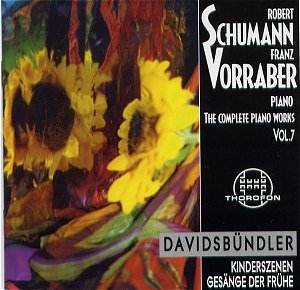The disc opens with an extraordinary performance
of ‘Kinderscenen’. It is not, of course, a virtuoso work, many
students tackle it, and many professional pianists try to make
more of it than is printed on the page. They take the opportunity,
if possible, to find points in the music where they might be able
to show off. Franz Vorraber does not do that. Instead he plays
with incredible freedom of rubato and to a certain extent almost
recomposes the music before your very ears. Is there a case for
this approach? Well there might be. I will explain.
Like Vorraber, I too fell in love in my early
teens with Schumann’s piano music. I persuaded my own teacher
that I should tackle ‘Kinderscenen’. My piano teacher at this
time c.1965 was over 70. He had been a student at the Royal Academy
around 1910 and he told me that his teacher at the Academy had
been a pupil of Clara Schumann in Germany. My teacher played therefore
with certain characteristics inherited from her and her school.
He assumed that Clara played Robert’s music as he would have done.
These characteristics included, often allowing the two hands not
to play together, playing with often excessive rubato at the whim
of the performer, repeating certain passages even if unmarked,
bringing out inner parts even if not marked, treating the dynamics
and articulation such as accents and staccatos only as possible
guidelines and to arpeggiate chords or not arpeggiate chords depending
on the performers preferred hand formations. My teacher himself
played in this way but said that this "is not the way you
should play Schumann nowadays". I was encouraged not to copy
him but to play the composer’s markings as precisely as possible
and chastised if I failed to do so. It initially came as quite
a shock to me to discover that Vorraber plays Schumann like my
old teacher, the tempi and expressive qualities in whose performances
now seem so muddled to me that aurally I often lose my way.
Vorraber often does not begin a number at the
tempo he continues with (Curious Story). He is fancy free
with arpeggiated chords (Reverie). He is inconsistent with
the composer’s printed articulation (The Knight of the Rocking-horse).
He repeats sections not marked (Frightening). He brings
out unmarked inner voices (About people and strange lands).
He alters dynamics (Frightening), shortens pauses and other
note values (At the Fireside). I cannot blame the editions
as I have checked two and find that they agree.
Yet having said all of that I am not necessarily
being negative. I genuinely feel that I am hearing this music
as Schumann and his wife probably played it - a really authentic
performance. I just don’t like it.
Vorraber has recorded on thirteen CDs all of
Schumann’s piano music. He obviously loves it as the booklet notes
by Dr. Gerd Nauhaus make clear. He has performed all of it in
concert series across Europe. In other words he has had time to
get to know the music - all of it, and has reached his performance
style after due thought and consideration and experience.
In all the three works recorded he plays the
slower pieces with that ideal sense of dreaminess. I was particularly
moved by ‘Almost too serious’ where the off-beat right-hand
melody is perfectly set … and rock-steady against the left hand.
What is so odd is that the performance of Kinderscenen seems
to settle down as it runs on so that the last movement (The
poet speaks) is played completely straight, when it, more
than others, probably deserves a freer approach.
Similar stylistic comments could also apply to
the next work on the CD. This is Schumann’s last piano composition,
the little known Op.133 ‘Gesänge der Frühe’.
This is a beautiful work which needs sensitive handling and which
I enjoyed in this recording. But with the ‘Davidsbundlertänze’
the same problems of over-emphasis on accents and chronically
unsteady tempo often made me feel sea-sick. Coupled with that
is a feeling, in some of these pieces, that the piano’s middle
register was in need of more careful tuning. This quite threw
me.
Having said all of that I still find Vorraber
a fascinating pianist who keeps my interest. Surely that must
count for a great deal.
This CD then is not for the faint-hearted. I
cannot really recommend it but I will add, totally unhelpfully
I know, that it is also fascinating.
Gary Higginson.
